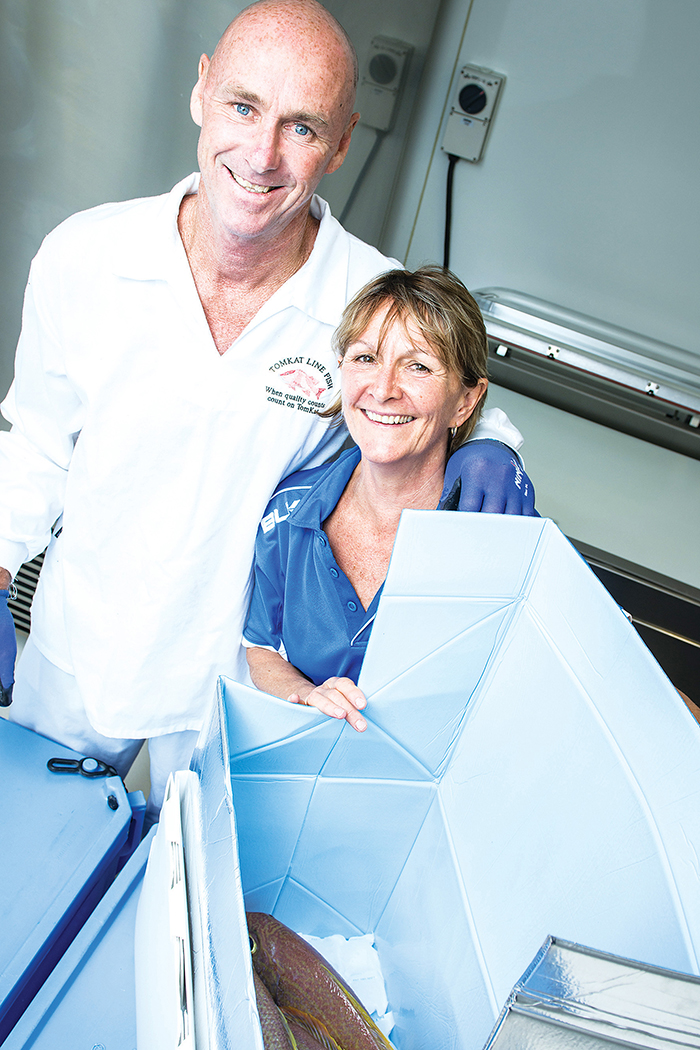An environmentally friendly alternative to the ubiquitous polystyrene boxes used in the seafood sector is poised to enter the market, developed by fishers, for fishers, with many benefits including superior thermal performance
By Catherine Norwood
A small Queensland fishing business is challenging the US$30 billion global polystyrene industry to adopt a new environmentally benign material for cold-chain packaging, especially for temperature-sensitive products such as seafood.
Polystyrene dominates the packaging industry (and landfill sites) worldwide, largely because there seem to be few, if any, alternatives with the same weight, durability and thermal traits. That, however, did not deter Tom and Kath Long, whose company, TomKat Line Fish, supplies upmarket restaurants with reef fish.

Their journey towards a better box began with an invitation to join a Fish-X workshop in Brisbane in 2018, part of an innovation program funded by the FRDC. The Longs’ original intention was to improve the marketing for their fishing business, which they established in 2012 on principles of environmentally responsible practices.
Kath says they quickly realised that the single-use polystyrene boxes and plastic liners they were using to airfreight their fish to market did not fit the aspirations of the business; they needed to find an alternative.
The FRDC provided a travel bursary that allowed the Longs to attend the Seafood Expo Global 2018 in Brussels to search for other options. When the Longs realised there were no real alternatives, they did what all needs-based innovators do: they set out to invent their own.
Tom was a plumber before turning to fishing and knew of a number of insulation materials that he believed could be repurposed to provide alternative packaging. The outcome of their research and development is the TomKat KoolPak®, a tough, lightweight container with thermal qualities needed for transporting and storing fresh foods and other cold-chain products such as medicines.
The KoolPaks are reusable and recyclable, and each component – the box, lid and thermal liner – can be tracked throughout its life, including end-of-life write-off at a recycling centre. Another high-tech touch is that the internal temperature can be monitored without opening the container.
Tom Long sees the reuse and flat-pack features as integral to making the boxes as cost-neutral and resource-efficient as possible.
A simplified life cycle analysis of the KoolPaks highlights the significant environmental benefits of reuse.
“The Australian seafood sector uses 10 million polystyrene boxes a year. To replace those with a box that can be used at least five times would only require two million boxes,” he says.
For a business, the cost of a $30 box drops to $6 when used five times. In-market testing indicates KoolPaks can easily be reused 10 times; some trials have reused boxes more than 20 times. The flat-pack design offers additional savings by minimising transport costs and storage space required for empty boxes.
Working with collaborators in the food processing sector, the Longs have also developed cleaning processes, along with hanging racks for vertical storage of the flattened boxes between uses. “Our aim is to provide solutions right along the supply chain to make our boxes as easy as possible to use,” Tom says.
In 2019, the Longs received an AusIndustry Accelerating Commercialisation Grant of $273,400, which proved critical to progressing the KoolPak from prototype to tech-enabled product ready for commercial manufacture, with international patents pending.
The Longs have begun small-scale local production at Kurrimine Beach, in Far North Queensland. A full-scale manufacturing plant is planned for the region during 2022, with the help of an Advanced Manufacturing Growth Centre Grant and the Advance Queensland Ignite Ideas Fund. The initial production line will be for 59-litre KoolPaks (570 x 370 x 370 millimetres). Other sizes are planned, including one for the Atlantic Salmon sector. f
More information
Tom and Kath Long, www.koolpakbox.com
https:bit.ly/3Bsi65a
FRDC RESEARCH CODE
2017-058





